Art & Exhibitions
artnet Asks: DJ and Hyperrealistic painter Frank Bauer
German artist's solo exhibition opens at Galerie Voss in Düsseldorf on August 29th.
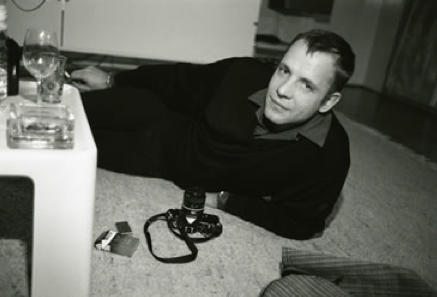
German artist's solo exhibition opens at Galerie Voss in Düsseldorf on August 29th.

Lorraine Rubio

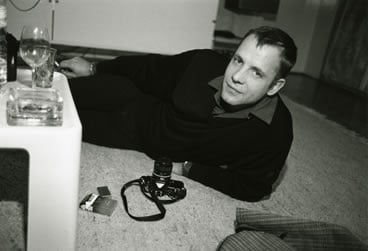
Frank Bauer photographed by Gerno Michalke.
Photo: Courtesy Frank Bauer Archive.
German painter and DJ Frank Bauer takes the everyday—friends, airplanes, even abandoned beer cans—as the subject of his large and hyperrealistic paintings. Bauer attended university at Art Academy Düsseldorf, studying under Gerhard Richter. Based upon photographs of seemingly uneventful moments, Bauer’s paintings have undertones of melancholy and show a societal desire for glamour. The artist’s work is the subject of an upcoming solo exhibition, “Back to Basics”, opening August 29th at Düsseldorf-based Galerie Voss.
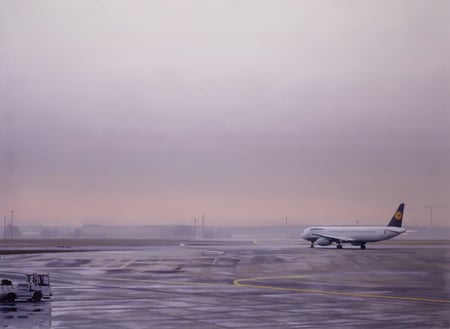
Frank Bauer, Flughafen (Frankfurt 2) (2009)
Oil on canvas 220 x 300 cm
Photo: Courtesy the artist and Galerie Voss.
When did you know you wanted to be an artist?
I actually never knew that I wanted to be an artist- in school my teachers noticed that I was drawing something all the time and they allowed me to keep on with it (unless my attention to their teachings suffered). Then in the 13th grade my art teacher encouraged me to apply at the Art Academy Düsseldorf, she had studied there herself and she send me to the late Erwin Heerich who used to be her teacher. I showed him my drawings and he was reserved but kind and encouraged me to go on. Drawing was so natural to me that I never recognized it as a special talent until someone else told me it was. So I was very surprised, when my application (at art school) succeeded. Only during my years there, my self perception as being an “artist”grew and I realized, that in order to make a living of it, I’d have to take it serious. So, to answer your question, I realized I was already an artist before I decided that I wanted to become one.
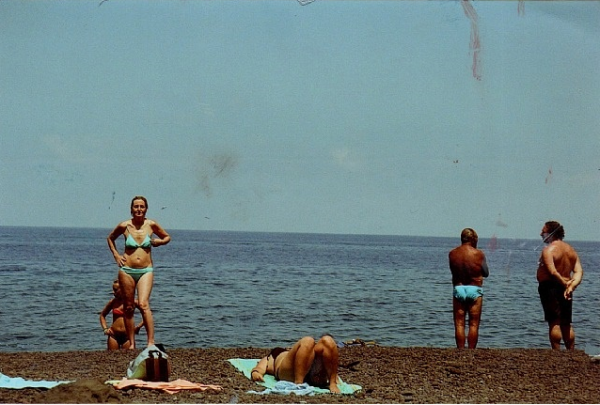
Frank Bauer, Stromboli (2013)
Oil on canvas 47.2 x 59.1 in.
Photo: Courtesy the artist and Galerie Voss.
What inspires you?
Inspiration is a very difficult thing to understand, let alone to explain. Agnes Martin has written about it a lot and I admire her writings for their razor sharp clarity. I have the impression, that inspiration is something that comes to me if I have an open mind. I can’t look for it, and something that is inspiring one day is boring on the next. In order to keep the flow of inspiration steady, I thought about it a lot, but so far I haven’t found a way to get around those dreadful times when inspiration just doesn’t come. Not having any inspiration is obviously part of it, like sowing is to harvesting.
It appears to me, that I carry the paintings inside me somehow, like a matrix, and whenever I see something that fits into this matrix, I feel inspired to paint it. Often, after painting something, I realize that I was influenced by someone else´s work, and wonder, why certain images stick to me and some don’t. Inspiration happens on a subconscious level, therefore understanding it always comes later, after the work is done. I trace my own mind and discover the inner meanings, but I can never tell beforehand what is going to come. Agnes Martin said, that it is necessary to keep your mind empty of influence and that thinking about other painters ruins your work. That might be true for her, but for me it’s often the contrary. Sometimes during painting, when I get stuck and don’t know how to solve a problem. I sometimes think “What would Manet do?” or “How would Vermeer paint this?”, and then inspiration is there again. You can’t keep everything out of your mind. Influences are many and sometimes unnoticed. My parents took me to many museums as a child and I remember vaguely being awestruck by a painting by Franz Gertsch in Cologne, when I was maybe 10, which inspired me to a painting over 20 years later.
My painting has a lot to do with how I feel, even though I sometimes don’t know it myself. For example, during the “Frost” series someone asked me if I felt depressed, and I denied, not realizing myself that I was going through emotional trouble then. Obviously there is something fundamental to me, a view on the world, which shows in the paintings, but which is in great parts hidden to myself. That is why I couldn’t do other work, paint in a completely different style, or work in a different genre.
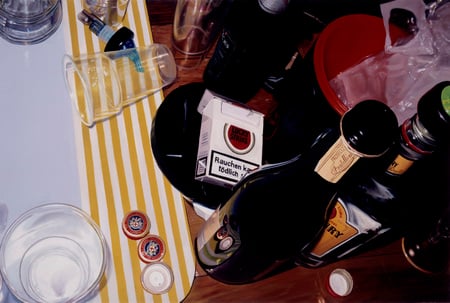
Frank Bauer, Halloween (bei Stephanie) (2010)
Oil on canvas 39 x 59 in.
Photo: Courtesy the artist and Galerie Voss.
If you could own any work of modern or contemporary art, what would it be?
Wheat (1957) by Agnes Martin.
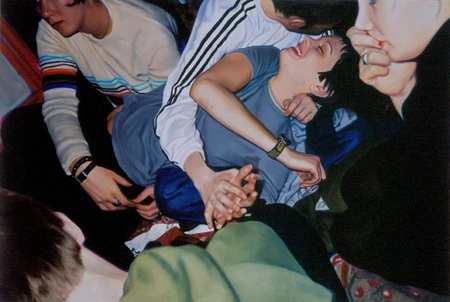
Frank Bauer, Teenager (1999)
Serigraph 39 1/2 x 53 in.
Photo: Courtesy the artist and Galerie Voss.
What are you working on at the moment?
I’m working at the last painting to be exhibited in the upcoming show, a portrait of two friends of mine, Katja and Nicole. I took the photo in 1999, and painting it now has something to do with trying to connect to my roots. (That has also to do with the title of the show, “Back to Basics”.) The two girls are lying on the floor, and as the picture was taken directly from above. The painting can be shown whichever side up, which I like, so the owner can decide how he wants to hang it.
When not making art, what do you like to do?
I’m playing in band and I love collecting and playing music. It’s been a dream of mine since I was 17 to make a record with a band one day, and now this could actually happen. I’ve collected some vintage analog synthesizers and it’s a lot of fun playing them.